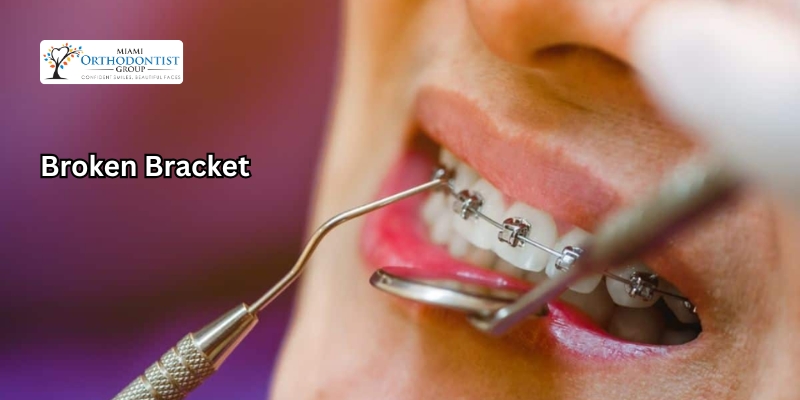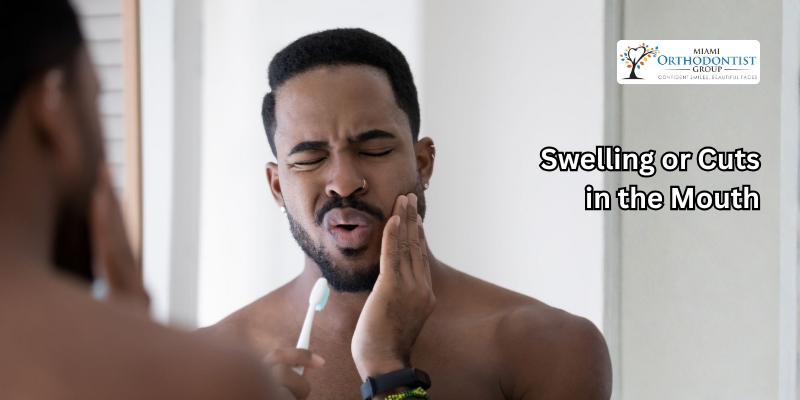You know how it goes—everything’s fine until it isn’t. You’re halfway through a family trip, maybe somewhere sunny, or you’re visiting relatives for the holidays, and suddenly your braces decide now is the perfect time to cause chaos. A wire pops loose, a bracket breaks, or one of those tiny rubber bands goes missing. It’s almost like your teeth know you’re away from your orthodontist.
Orthodontic emergencies during holidays or travel aren’t exactly common, but when they happen, they can be really uncomfortable. The good news? Some of them are things you can handle to prevent further damage. Here are some survival tips to handle some orthodontic emergencies.
Survival Tips for Orthodontic Emergencies
1. Loose or Poking Wire? Don’t Panic—Here’s What to Do
Loose or poking wire is a common issue people face with their dental appliances.
If you ever experience that, first check whether the wire has just slipped out of its bracket or is actually broken. If it’s simply out of place, you can try to gently push it back into position using a clean cotton swab or the eraser end of a pencil. Don’t force it—guide it enough so it’s not digging into your cheek.
If it’s still poking you, grab a little orthodontic wax (which, by the way, should always be in your travel bag) and cover the sharp end. It’ll instantly make things more comfortable until you can get it fixed properly.
And if you forgot your wax? A tiny piece of sugar-free gum can work in a pinch. It’s not ideal, but it’ll save your mouth from irritation for the moment.
2. Broken Bracket? Keep It in Check

A broken bracket can sound scary, but it’s usually not an emergency. It happens more often than you’d think—maybe from biting into something too hard (looking at you, caramel apples and holiday nuts) or from a simple accident.
If the bracket is still attached to the wire and not causing pain, leave it alone. You can secure it with a small piece of orthodontic wax to stop it from moving or rubbing your gums. If it’s completely loose and sliding around, carefully remove it if it comes off easily—make sure you keep it in a safe place and bring it to your orthodontist when you’re back.
Now, if the bracket is causing real discomfort or the wire is sticking out, use nail clippers (sterilized, of course) to snip the end of the wire close to where it’s poking. That’s only if you really need to, and only as a last resort. Otherwise, cover it with wax and wait until you can see your orthodontist.
3. Soreness or Pressure? Totally Normal (But Here’s How to Help)
If you’ve recently changed aligners or had an adjustment before your trip, don’t be surprised if your teeth feel sore for a few days. That’s your orthodontic treatment doing its job.
You can reduce the pain and manage the discomfort with over-the-counter pain relievers like acetaminophen or ibuprofen. Another trick you can use is rinsing your mouth with warm salt water. This will help reduce the swelling and stop gum irritation.
You can also stick to soft foods—mashed potatoes, soups, yogurt, or scrambled eggs—for a day or two until things feel better. Basically, skip the crunchy snacks until you’re back to normal.
4. Aligners Acting Up? Keep Extras and Stay on Schedule
If you’re traveling with Invisalign or clear aligners, your emergencies will look a little different. The biggest issues tend to be lost, cracked, or forgotten trays.
Here’s the golden rule: always pack your previous and next set of aligners when traveling. That way, if you lose or damage your current set, you have a backup plan. If you’re closer to switching to the next stage, move forward. If you just started a new set, pop back to the previous one to keep your teeth stable until you can replace the lost tray.
And please, don’t wrap your aligners in napkins when you’re eating—that’s the number one way people accidentally throw them away. Get a small case and make it part of your mealtime routine.
5. Swelling or Cuts in the Mouth? Treat It Gently

If a wire or bracket has been rubbing your mouth raw, you might notice a small sore spot. It’s common, especially if you’re new to braces or wearing them longer than usual without adjustments.
First, rinse with salt water to keep the area clean. You can also dab a bit of orthodontic wax over the part that’s irritating you. If the sore looks infected or gets worse, find a local dentist for a quick check—most dental offices can handle minor orthodontic issues.
For swelling, stick with cold compresses and avoid spicy or acidic foods until it heals. Think mild, soothing meals—smoothies, soups, or even ice cream (that one’s a win).
6. When It’s Time to See a Local Orthodontist
Most problems can wait until you’re home, but sometimes you really do need professional help. If you’re in severe pain, have a wire sticking into your gums, or notice any signs of infection (like pus or intense swelling), it’s worth finding a local orthodontist or dentist.
Before traveling, ask your orthodontist for recommendations or partner clinics at your travel destination.
If you’re abroad, look up local dental associations or reputable clinics online. And if all else fails, a quick call to your orthodontist’s office might get you the guidance you need—even from miles away.
Final Thoughts
Dental emergencies can happen anywhere, whether you’re at home or on vacation. You can’t really see them coming most of the time. But you can always prepare yourself for such emergencies and prevent them from escalating.
Remember the basics: keep wax handy, rinse with salt water, stick to soft foods, and don’t panic. And above all, communicate with your orthodontist if you’re unsure what to do—even a quick phone call can save you much discomfort.

